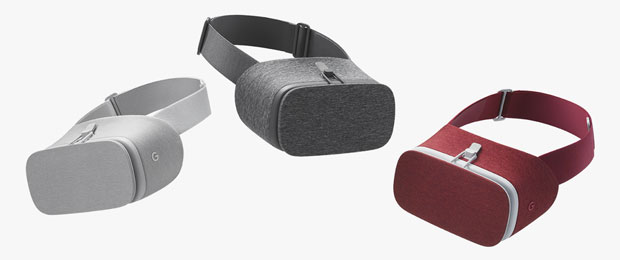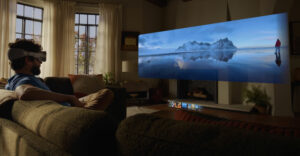Reviews for Google’s Daydream View VR headset began to appear on Thursday, and the consensus among those who were able to test the new US$79 device appears to be two thumbs up.
Although it has limitations, Daydream could be a gateway to affordable virtual reality technology, they suggested. The headset, which is powered by the VR platform introduced in Android 7.1 Nougat, needs to be paired with Google’s new line of Pixel and Pixel XL phones.
Unlike Google’s low-end Cardboard headset, Daydream is made of lightweight fabric and paired with a simple yet intuitive controller.
As with any new technology platform, there is a chicken-and-egg challenge to overcome regarding software for the device, but Google already has lined up content from a number of partners, including The Wall Street Journal, The New York Times, USA Today and CNN, in addition to its own offerings.
Early adopters will be able to make virtual visits to museums, faraway cities, other planets and more.
The View headset also can operate as a very personal home theater, providing a virtual big screen experience. Google has lined up partners including YouTube, Hulu, HBO Now and Netflix. Daydream also can be used as a VR video gaming platform.
VR Done Simple
The Daydream View is a rather simple unit, but it provides a true VR experience for the budget-minded early adopter.
“The View might be significantly more wearable than a Google Cardboard viewer, but it’s still essentially the same thing: a phone holster with some lenses in it,” wrote Peter Rubin for Wired.
“One of the strongest points Daydream View has in its favor is the comfort of wearing it. … Google has hit the mark with its design,” noted Digital Trends’ Julian Chokkattu.
Among the Daydream View’s limitations are power consumption.
“VR apps and games will drain your phone’s battery quicker than almost any other activity,” wrote Nathan Olivarez-Giles for The Wall Street Journal.
Control Issues
The controller for the Daydream View, which reviewers mostly praised, is not without its issues. The consensus view seems to be that there is much room for improvement.
“It sometimes stops working,” noted Chokkattu, in his case, possibly due to a lost Bluetooth connection.
“My controller’s position sometimes drifted out of place, mostly during experiences that snap the cursor toward something on screen, pulling it away from the remote’s real-world orientation,” wrote The Verge’s Adi Robertson.
The Reality of VR Today
VR technology is still in its early days, but Daydream View is a “much more serious crack at bringing VR to mainstream audiences,” said Roger Kay, principal analyst at Endpoint Technologies Associates.
“It is a great showcase for YouTube VR,” he told TechNewsWorld.
However, Daydream View “is really still just the entry level to VR,” observed Roger Entner, principal analyst at Recon Analytics.
“This is a device that the early evangelist will adopt, as it provides a basic VR capability,” he told TechNewsWorld.
“Google Daydream View has the benefit of being Android device-agnostic as opposed to the Samsung Gear VR, and at a lower price — $79 vs. $99,” noted Stephanie Llamas, lead analyst for AR/VR technology at SuperData Research.
“The Google name also lends itself to brand visibility, which will attract the trust of many consumers,” she told TechNewsWorld.
From Dream to Reality
Along with its many pros, Daydream View has some challenges to overcome.
One obstacle is its lack of compatibility with most phones on the market right now, suggested Super Data Research’s Llamas.
“Users need to purchase a Pixel phone until more phones are compatible with Android Nougat and the device itself, and even then they will need to upgrade, which may exclude a lot of consumers for a long time,” she explained.
That said, ubiquity is likely to be one of its strengths in the future, suggested Recon Analytics’ Entner.
“Many phones will have great Daydream capabilities in a short time, and it is Google’s drive to build a standard,” he pointed out.
The Daydream’s content catalog leaves much to be desired, but by the time the adoption of compatible devices is realized, “Google will have rolled out more experiences that both come from reputable developers and reach a wider audience,” predicted Llamas.
Even if it achieves compatibility among phone models, the mobile platform could pose difficulties.
“Mobile is still the weakness, as a phone doesn’t have the horsepower to do VR right,” Entner warned.
“This is really a VR-lite solution — and while everyone can have it, the technology really can’t hold a candle to a computer-based solution,” he added. “Who wants to do VR if it isn’t really fully VR?”
VR in the Real World
It can be argued that mobility isn’t advantageous for a technology that disconnects users from their physical surroundings.
“VR needs to be used in a protected environment,” said Entner.
“You are truly replacing your reality with a virtual one, and this can put you at risk when you can’t see the real world,” he cautioned.
“You need VR in a room with no obstacles and where people mean you no ill — so mobile isn’t the best way to go,” Entner said. Still, “this is still the early days — and for the early adopters, this is a way to wet the whistle.”






















































